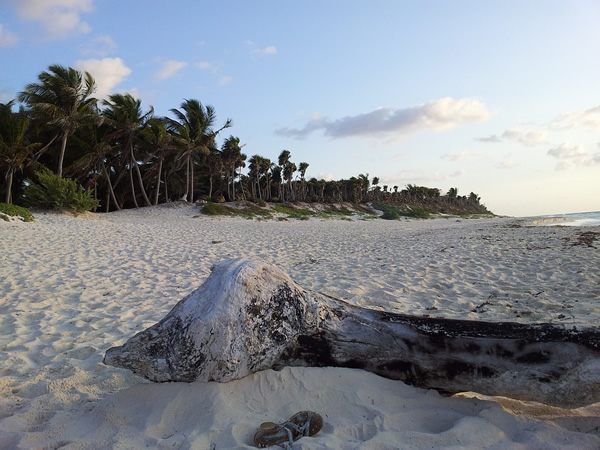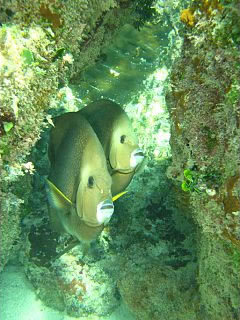Volunteer in Mexico to Conserve Coral Reefs
How an expedition in Mexico provided valuable research for the coral reef systems of the Mesoamerican Reef, along with the reward of additional diver training
By Cheryl S. MacDonald
Resources updated 12/23/2023 by Transitions Abroad

|
|
View of the beach in Mexico.
|
While finishing my transect for the morning's fish monitoring session, I glanced up to find myself face-to-face with two beautiful gray angelfish. Quickly, I gathered my data slate — with notes about my morning's transect activities along with the measuring tape and monitoring stick — and put it back into the dive bag. I weighed down the gear bag with an extra two-pound weight. I could play with the fish for eight minutes of allotted "bottom time." We were off after a nod in agreement with a colleague that it was time to check out overseas life from the perspective of tourists and not scientists. As I slowly approached the beautiful fish, they did not seem bothered by my presence but rather curious. We seemed equally intrigued with each other. Now faced with these two magnificent angelfish, I thought, "Who would have ever imagined?"

|
|
Angelfish staring back at me in coral reef. Photo by Cheryl S. MacDonald.
|
I had previously been a PADI copen-water diver for nearly fifteen years, but I was one of those occasional divers who would take a dive vacation once a year. A dive vacation meant getting in one or two dives in a week between Pina Coladas by the pool. Diving was something to enjoy, but it was not a big part of my life. That was until I came across an organization called GVI. The organization offers a five or 10-week program centered around diving and researching the Mesoamerican reef — the world's second-largest barrier reef. The program is for Scuba beginners and those who are more advanced. Although certified for several years, I was still very much a beginner. The 10-week expedition offers diver training, education, and research opportunities. We would live twenty meters from the shore, dive daily, and learn about local sea life while assisting the science officers by gathering pertinent data.
The site of our expedition was near Tulum, Mexico, on the Yucatan peninsula, and was about a two-hour drive from the south of Cancun. The expedition base is called Pez Maya. The base is in the heart of the Sian Ka’an Biosphere Reserve, home to various flora and fauna.
Living as a Volunteer in Mexico
Due to its remote location, there are few conveniences I had previously taken for granted; it was pretty rustic. My new home for the next ten weeks was a "hut" with three bunk beds. Six of us would be sharing a relatively small living space. The shower consisted of a bucket of water pulled up from the well and brought to an outdoor location surrounded by palm trees. We were allowed three buckets per week for our showers, but one-half bucket per "shower" was more than enough. Conservation is a buzzword you hear often in Pez Maya. A bucket of water also flushed the bathroom toilet. Since we did not have access to permanent electricity, we also had no refrigeration, so most of our meals tended to be vegetarian and were very filling and healthy. Some aspects of this scenario might make the living conditions seem miserable. But that was not the case at all. After a week of adjustment, I embraced this new way of living. We did live twenty meters from the beach, with gentle, warm breezes and swaying hammocks to enjoy in our downtime and the smell of salt in the air.
Within the first week, we learned about the local reef fish, the coral reefs, and their environmental impact. We also learned various monitoring techniques to gather data on undersea life. We were required to learn identification, stages of growth, and how to judge the size of 150 adult and 25 juvenile fish species. If you were assigned coral, you had to know the 50 coral reef species by their Latin names and various types of bleaching and algae diseases and their effect on the coral. All of this was quite a bit to take in during a week, but the information was all so intensely interesting that it was surprisingly easy to grasp. After testing assessments to ensure that we could accurately identify the fish and coral, we were ready to begin with our underwater data gathering.
By the second week — between additional lectures on marine conservation, oceanography, first aid, research diving skills, marine survey skills, and fish and coral identification — we started to log more dives towards our Advanced Open Water certification, included in the 10-week package. After one week of learning so much about diving while perfecting my skills, I was hooked and wanted to know more! There were indeed opportunities to do so. Because I had planned to complete the entire expedition, I was offered several options for additional diver training while continuing the ongoing research. I elected to go through and achieve my Dive Master Certification. Over the next nine weeks, averaging two dives a day, six days a week, I completed an Emergency First Response (EFR) certification, Coral Reef Research Diver, Cavern Diver, Rescue Diver, and finally, my Dive Master certifications. While a lot of hard work — both physically and mentally — in the end, it was all worth it. In addition, due to our remote location, we were also allowed to work on first aid and oxygen machines, maintain diving equipment, use compressors to fill tanks and learn regulator mechanics. When would I ever be able to do all this while on an ordinary vacation?
I began my 10-week adventure as a mediocre diver with less than twenty dives in my logbook. I left with close to 100 logged dives, several new certifications, and a new appreciation for diving and what it offers. When I finished my volunteer experience, I now had a new option for a job in the dive industry due to all the training provided. GVI provided me with the tools, training, and confidence necessary to enter a great new career. I gained all these valuable skills and experiences and contributed to studying a vital coral reef during a great and memorable vacation!
For More Information on Volunteering with GVI
There are many exciting volunteer opportunities in Mexico and Central America. Several organizations offer programs to meet the following interests: Conservation, adventure, and cultural initiatives. I chose GVI because of this expedition's strong emphasis on diving education and the level of involvement with research and the conservation of local marine life. In addition, their vision and mission include promoting sustainable solutions that match personal goals.
What’s included in GVI's Marine Conservation Expedition in Mexico Program:
-
24-hour emergency phone
-
24-hour in-country support
-
Access to Alumni Services and Discounts
-
Airport pick-up (unless otherwise stated)
-
All necessary project equipment and materials
-
All necessary project training by experienced staff
-
Community work workshop
Coral reef ecology
-
First Aid & CPR training
Live and work in a protected reserve surveying deserted reefs under GVI’s research permit
-
Location orientation
-
Long-term experienced staff
-
Meals while on project (except on work placements for long-term internships)
-
PADI Coral Reef Research Diver Distinctive Speciality
-
PADI Open Water (for 8 and 12 week volunteers) and Advanced Open Water
Global Vision International offers various other volunteer expeditions in Mexico (as well as many other countries in Latin America and worldwide) to meet almost any interest. Visit their website for expedition itineraries and more information, photo and video libraries, stories from the field, and life on the expedition.
For those interested in other volunteer experiences in this beautiful and richly varied area of Mexico and Central America, here is a sampling of options available with GVI or other volunter organizations:
Conservation Based Volunteering:
-
Sea turtle conservation
-
Marine conservation
-
Ecology conservation
Cultural Initiatives:
-
Working with schoolchildren
-
Contributing to the community
-
Teaching English
|
Cheryl S. MacDonald is on a two year long around-the-world adventure — volunteering, learning, and writing a book series “What Boundaries? Live Your Dream!”
|
